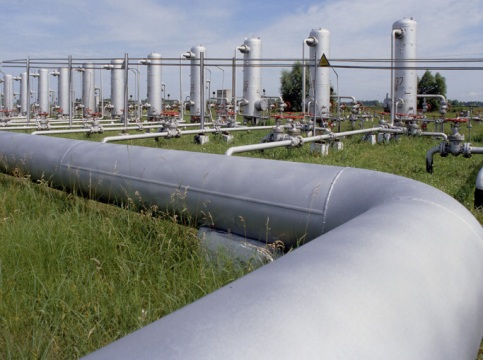Azerbaijan can facilitate joining Caspian countries to Southern Gas Corridor:EC

By Gulgiz Dadashova
Azerbaijan is a door opener in the process of joining the Caspian countries to the Southern Gas Corridor, whose further enlargement of the Corridor has the potential to meet up to 20 percent of the EU's gas needs, the European Commission's spokesperson told AzerNews.
There are also further major sources in the Southern Gas Corridor, linking the EU to Turkey, the Eastern Mediterranean, Iraq, Azerbaijan, and other countries.
"The Shah Deniz 2 decision is only the beginning of the Southern Gas Corridor and we expect the corridor to grow swiftly, bringing more volumes of gas not only from Azerbaijan, but also from other countries in the Caspian region, to Europe. The EU aims to see 10 percent of EU gas demand satisfied through this corridor in the medium term," the spokesperson said.
TAP, which is designed to supply the Caspian gas to Europe, will transport natural gas from the giant Shah Deniz II field in Azerbaijan to Europe. The approximately 870-km-long pipeline will connect to TANAP near the Turkish-Greek border at Kipoi, cross Greece and Albania and the Adriatic Sea, and come to Southern Italy.
The spokesperson further noted that the first call for funding by the Connecting Europe Facility, which will provide €5.8 billion for 2014-2020 to energy infrastructure projects in the EU, is supposed to take place in 2014. The grant decisions are foreseen at the end of 2014.
The Commission's so-called list of "Projects of Common Interest" (PCI) includes those that are eligible for the EU's funding. The Southern Gas Corridor has explicitly been selected as a priority corridor in order to enhance the security of supply.
"We are talking about a cluster of integrated, dedicated, and scalable transport infrastructures and associated equipment for transporting a minimum of 10 bcm a year from the new gas resources in the Caspian Region, across Georgia and Turkey, and ultimately to EU markets through two possible routes: the first route crosses South-East Europe and reached Austria, and the other one reaches Italy through the Adriatic Sea," the source noted.
The following projects have been granted the PCI status with the potential possibility of EU funding: Gas compression station at Kipi (EL), Gas pipeline from Greece to Italy via Albania and the Adriatic Sea [currently known as the "Trans-Adriatic Pipeline" (TAP)], Gas pipeline from Greece to Italy via the Adriatic Sea [currently known as the "Interconnector Turkey-Greece-Italy" (ITGI)], Gas pipeline from Bulgaria to Austria via Romania and Hungary, and Gas pipeline from the EU to Turkmenistan via Turkey, Georgia, Azerbaijan, and the Caspian [currently known as the combination of the "Trans Anatolia Natural Gas Pipeline" (TANAP), the "Expansion of the South-Caucasus Pipeline" (SCP-(F)X), and the "Trans-Caspian Gas Pipeline" (TCP)] .
Speaking about the prospects of constructing other pipelines to bring the emerging Caspian gas reserves to Europe, the spokesperson said with the help of an effective and functioning internal energy market in the EU and the necessary infrastructure and reverse flows in place, once the gas enters the EU it can be transported anywhere in Europe.
"Championed by the European Commission, interconnections will enable the gas to reach Member States such as Romania, Bulgaria, and Hungary who have just one or few suppliers. It is in this sense that the European Commission has been working for the past years," he said. "Our main priority is to tackle the most vulnerable countries. For instance where Bulgaria is concerned, the Europe must work harder to assist the government to make long-term strategic energy decisions necessary for its energy security. The Commission is also working with Serbia and Bulgaria to build a connection between them, and Romania is now connected to Hungary and Bulgaria. The North-South initiative, spearheaded by the Commission, has put many small interconnectors in place that create a web of interconnection in South East and Central Europe. But more is still needed to bring competitive prices to Southern Europe."
Touching upon the Trans-Caspian gas pipeline project, the spokesperson again said the EU remains fully committed to finalizing these negotiations quickly, and consultations with all the parties are ongoing.
"The Southern Gas Corridor, including the Trans-Caspian Pipeline, remains a key policy priority for the European external energy policy," the spokesperson said.
With a length of around 300 kilometers, the Trans-Caspian Gas Pipeline will be laid from the Turkmen coast of the Caspian Sea to Azerbaijan, where it will be linked to the Southern Gas Corridor.
The pipeline's capacity is 30-40 billion cubic meters of gas per year.
Iran and Russia have expressed their skepticism over the project, saying that the construction of the pipeline may damage the Caspian Sea's ecology.
Azerbaijan and Turkmenistan, in turn, are cooperating on a strategy to gather the opinions of expert environmentalists who support the feasibility of installing undersea pipelines in the Caspian without damaging the sea.
Here we are to serve you with news right now. It does not cost much, but worth your attention.
Choose to support open, independent, quality journalism and subscribe on a monthly basis.
By subscribing to our online newspaper, you can have full digital access to all news, analysis, and much more.
You can also follow AzerNEWS on Twitter @AzerNewsAz or Facebook @AzerNewsNewspaper
Thank you!
